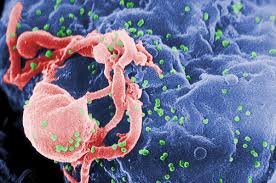A Guide to Accommodating HIV-Positive Patients in Your Practice
Dentists are doctors and pillars of their communities, providing care to those who need their services. Certain patients can challenge a dentist personally and professionally. If you're unsure of how to accommodate HIV-positive individuals who come to you seeking help, continue below to find out what you should know.

Dry mouth is one of the most common oral abnormalities associated with HIV.
After years of crisis, tragedy and panic, HIV diagnoses have reached a place of relative stability in the U.S., and those who contract it are no longer doomed to an agonizing death.
To be certain, this is good news, but the emotional toll diagnosis takes on an individual does not make their lives with HIV much less daunting. That’s why it’s crucial for dentists to be prepared for HIV-positive individuals and meet them with sensitivity, understanding, and all the resources a practice needs to make these patients comfortable. What’s more, dentists may want to consider encouraging their existing patients to find out their status by offering testing.
Offering Testing in Your Practice
More than 1.1 million Americans are HIV positive, according to the Centers for Disease Control and Prevention. Millions more have reason to believe they are at risk of contracting HIV. Due to these statistics, some argue that with improved oral detection, HIV testing should be a routine service offered by dental practices.
Dr. Catrise Austin, a New York City-based general and cosmetic dentist, is one such example of how dentists can successfully integrate HIV testing into their practices.
“When I learned that OraSure HIV Rapid testing involved just swabbing the mouth and putting the swab into a developing solution and you get the results in 20 minutes, I thought that it only made sense that dentists start offering this service,” Austin told POZ magazine.
There are a few things dentists must be aware of before they consider following in Austin’s footsteps, according to POZ. To meet the proper ethical and legal standards, dentists must secure the proper HIV test training, which can be viewed on CDC.gov.
According to Austin, getting certified was as simple as contacting her state’s department of health and undergoing month-long certification and training course.
Accommodating HIV-Positive Patients
Stigma and diagnosis-related depression and anxiety can make seeking any kind of health care difficult for HIV-positive patients, particularly the newly diagnosed. Treating these patients with respect and empathy is your ethical responsibility as a dental care provider.
The Dental Alliance for AIDS/HIV Care (DAAC) provides six basic principles for health care ethics and professional behaviors to which practices should adhere.
·All dental health care professionals have an ethical obligation to treat HIV-positive patients.
·All patients and dental health care professionals benefit when the dental care provider. collaborates with all other members of the patient’s primary health care team.
·Dental health care professionals must emphasize provider-patient confidentiality to patients.
·There are pros and cons to treating HIV-infected patients.
·A dentist’s relationship to the HIV-positive patient should be guided by trust and communication.
·The dentist should do what is necessary to help the patient make informed decisions.
Assessing your patient’s ability to make wise care-related decisions is part of this process. Ask yourself, does the patient comprehend the information the dentist presents to them? Does the patient seem alert and understanding of their situation? Some AIDS-related illnesses can compromise a patient’s cognitive process, according to DAAC, so it Is imperative that dentists evaluate the patient appropriately.
Infection Control and Dental Care
In addition to providing a welcoming, judgement-free atmosphere for HIV-positive patients, dental practices must take precautions when working with blood and bodily fluids to keep employees and HIV-negative patients safe.
The ADA recommends avoiding exposure to blood and bodily fluids by wearing barrier precautions and removing the protective equipment before leaving the work area.
“Though the occupational source of greatest risk of HIV transmission is percutaneous injuries, it is good to understand that after a needlestick exposure to HIV-infected blood, the average risk of HIV transmission is approximately 0.3%,” the ADA reports.
Reducing the risk of percutaneous injuries involves following standard precautions, having engineering controls and workplace controls for all sharps, and following safe injection practices. In the case of suspected exposure to HIV-infected material, the incident should be reported and the exposed individual should consult with a physician immediately.
Dentists preparing themselves to treat HIV-infected patients should be aware of the oral abnormalities associated with the illness. Xerostomia affects up to 40 percent of HIV-positive patients, making them more susceptible to the infections candidiasis, bartonellosis, cryptococcosis, cryptosporidiosis and histoplasmosis. As such, the combination of increased risk of periodontal disease and dry mouth leave these patients more vulnerable to caries.
For more information on developing treatment plans for HIV-positive patients, click here.
ACTIVA BioACTIVE Bulk Flow Marks Pulpdent’s First Major Product Release in 4 Years
December 12th 2024Next-generation bulk-fill dental restorative raises the standard of care for bulk-fill procedures by providing natural remineralization support, while also overcoming current bulk-fill limitations.